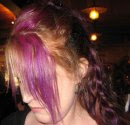“You are the Dancing Queen, young and sweet only seventeen, Dancing Queen
feel the beat from the tambourine, oh yeah you can dance, you can jive, having the time of your life… la la Dancing Queen.”
I saw Mamma Mia (the movie) about a month ago, for a few weeks I danced around with the tunes of ABBA ringing in my head. (btw U2 do a pretty good cover of Dancing Queen). After the tunes had faded I thought more deeply about the show.
Mamma Mia is fun, light and enjoyable (although the stage show was funnier and more engaging) yet there are some subtleties I would like to discuss. The show is obviously written by men with traditional values, and the gender issues raised need to be critiqued.
There are some surprising contrasts in this movie. Women are the primary characters in the movie; the men are left to play goofy sidekicks (I’ll let you guys complain about the implications of that). However the roles the women are given are merely the traditional three female archetypes that women have been protesting since the rise of feminism in the 1970’s. In Mamma Mia we have the traditional Mother, Virgin, Whore roles. Yes the roles have been updated for 2008 – the good mother no longer has to be married, the virgin is no longer sexually innocent, but is innocent in her values, approach to and experience of life. The 2008 Whore has married for money and is a sell out to brand names and capitalism. In Mamma Mia they are joined by the latest addition to the traditional roles for women, the intelligent, plump man-less best friend. The roles hardly present a challenge to the acting ability of the cast and I’m surprised that these actors who were mothers of freedom and choice for women settled for roles that promote such stereotypes.
Meryl Streep (one of my favourite actors) plays Donna an ex singer who runs a hotel and has a daughter (Sophie). Admittedly she isn’t just a mother – she runs a hotel too. However she has no passion for her business, she dreams of a man whisking her away to idle luxury on a super-yacht (money, money, money). She has worked hard on her hotel for 20 years, but is portrayed as being unable to make a success of it without a man. Sophie also needs a man to affirm her identity and to tell her that she’s good at drawing before she has the courage to experience the world and leave her mother to further her art.
There are some quite serious identity formation issues that are explored by the movie, and I don’t want to minimise the importance of these in any way. But there are some subtle messages that are spread by Mamma Mia that concern me. The first is that women are to passively wait to be ‘saved’ by a man who will ride in on a white horse, and rescue them. The passive waiting to be rescued role is surfacing more and more in movies lately, or perhaps never truly went away. Secondly we have the idea that a woman cannot be successful without a man, and if she is successful (like the plump best friend) she will be undesirable to men. Women also need to have their work recognised and declared good by men before they can be confident enough to take it to the next step.
The backwards movement in the representation of women in Movies and the media in general has also been observed by other commentators. Susan Faludi for example states, “A reflexive response to 9/11 was that the feminist movement had emasculated the American male and reduced his effectiveness in his primary role as head of the family and protector of vulnerable women and children. The media collaborated with politicians in reincarnating this old myth of masculine heroes and distressed damsels.”
Women’s representation in the media must be more strongly critiqued if we are not to fall back to traditional limited roles, that do not reflect the opportunities for and aspirations of today’s women. I want to see women who want to be successful and to take an active role in their own lives and in changing the world, not sitting passively waiting to be saved. The critique of women’s representation in the media needs to be advanced by younger women, ageing feminists like myself are ready to pass the baton on – however we do not see younger women stepping up to the plate. Who do you want to be? What images of women do you want your younger sisters to see? Are you happy that their heroes are those who have sleaze and style over substance or even talent?
Waiting for your comments
Christina
Tuesday, September 09, 2008
Subscribe to:
Posts (Atom)
